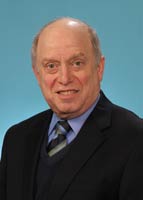Alan Pestronk, MD

Alan Pestronk, MD, professor of neurology and of pathology and immunology, is recognized for his significant contributions as a clinical neurologist and educator.
Pestronk serves as director of the Neuromuscular Diseases Section of the Department of Neurology and director of the Neuromuscular Clinical Laboratory — roles he has held since joining the Washington University faculty in 1989.
He is considered one of the premier clinical neurologists in the area of neuromuscular disease, providing outstanding patient care. He has been listed in Best Doctors in America since 2002. His creation of the Neuromuscular Disease Center website (neuromuscular.wustl.edu) is a significant additional contribution. The site provides detailed descriptions, updated daily, of the clinical and laboratory features, treatments and pathology of thousands of neuromuscular disorders. It is free to physicians, researchers and patients and is accessed each day by an average of 3,300 users from 102 countries.
Also a highly regarded translational scientist, his 214 peer-reviewed papers include: descriptions of 15 new genetic, immune or toxic neuromuscular disease syndromes; discovery of tests used worldwide for diagnosing immune-mediated diseases of nerves and muscles; and a series of muscle pathology studies that provide new methods of classifying, diagnosing and studying immune myopathies and their underlying mechanisms.
Pestronk shares his encyclopedic knowledge of neuromuscular disease as an exceptional educator who has trained 82 fellows. Among the ranks of his former trainees are department chairs, division heads, academic faculty and clinicians. Under his leadership, the neuromuscular group and fellowship program at Washington University has grown to be among the largest in the nation, known for its depth and breadth.
Pestronk received his bachelor’s degree from Princeton University in 1966 and his medical degree from Johns Hopkins University in 1970 and completed his postgraduate training at the Jewish Hospital of St. Louis and Johns Hopkins Hospital.




